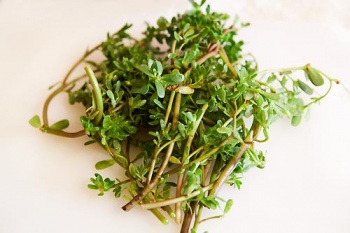Difference between revisions of "Purslane"
From Wikiwel
| (5 intermediate revisions by the same user not shown) | |||
| Line 1: | Line 1: | ||
[[File:Purslane.jpg|thumb|350px|left|Purslane]]Other names : Portulaca oleracea, common purslane, verdolaga, pigweed, little hogweed, Pursley, Moss rose, Ma Chi Xian<br> | [[File:Purslane.jpg|thumb|350px|left|Purslane]]Other names : Portulaca oleracea, common purslane, verdolaga, pigweed, little hogweed, Pursley, Moss rose, Ma Chi Xian<br> | ||
| − | Although the FDA classifies purslane as a broad-leaved weed, it's a popular vegetable and herb in many other countries, including China, Mexico, and Greece. | + | Although the FDA classifies purslane as a broad-leaved weed, it's a popular vegetable and herb in many other countries, including China, Mexico, and Greece.<br>see also : [[Claytonia Perfoliata]] |
==Special Precautions of Purslane== | ==Special Precautions of Purslane== | ||
| + | * do not confuse with [[Brooklime]] which is called Water Purslane. | ||
| + | * Use is contraindicated during pregnancy and for those with cold and weak digestion. | ||
| + | |||
==Benefits and uses of Purslane are== | ==Benefits and uses of Purslane are== | ||
* Cardiovascular disease : Purslane has the highest amount of heart-healthy omega-3 fats of any edible plant, according to researchers at the University of Texas at San Antonio. Purslane leaves (which can be eaten as a cooked vegetable) contain more omega-3 fatty acids than any other edible plant, making them good for improving brain and cardiovascular function. | * Cardiovascular disease : Purslane has the highest amount of heart-healthy omega-3 fats of any edible plant, according to researchers at the University of Texas at San Antonio. Purslane leaves (which can be eaten as a cooked vegetable) contain more omega-3 fatty acids than any other edible plant, making them good for improving brain and cardiovascular function. | ||
| − | * Cancer : Researchers discovered that purslane contains between 10 and 20 times more of the cancer-inhibiting antioxidant, [[melatonin]], than any other fruit or vegetable tested! | + | * Cancer : Researchers discovered that purslane contains between 10 and 20 times more of the cancer-inhibiting antioxidant, [[melatonin]], than any other fruit or vegetable tested! And a rare subclass of Homoisoflavonoids, from the plant, showed in vitro cytotoxic activities towards four human cancer cell lines |
| − | + | * Betacyanins isolated from Portulaca oleracea improved cognition deficits in aged mice. | |
| + | * Purslane is a clinically effective treatment for oral lichen planus | ||
| + | * its leaves are used to treat insect or snake bites on the skin, boils, sores, pain from bee stings, bacillary dysentery, diarrhea, hemorrhoids, postpartum bleeding, and intestinal bleeding | ||
[[Category:Treatments]] | [[Category:Treatments]] | ||
[[Category:herbal medicine]] | [[Category:herbal medicine]] | ||
| + | [[Category:Bitter]] | ||
Latest revision as of 04:33, 1 January 2020
Other names : Portulaca oleracea, common purslane, verdolaga, pigweed, little hogweed, Pursley, Moss rose, Ma Chi XianAlthough the FDA classifies purslane as a broad-leaved weed, it's a popular vegetable and herb in many other countries, including China, Mexico, and Greece.
see also : Claytonia Perfoliata
Special Precautions of Purslane
- do not confuse with Brooklime which is called Water Purslane.
- Use is contraindicated during pregnancy and for those with cold and weak digestion.
Benefits and uses of Purslane are
- Cardiovascular disease : Purslane has the highest amount of heart-healthy omega-3 fats of any edible plant, according to researchers at the University of Texas at San Antonio. Purslane leaves (which can be eaten as a cooked vegetable) contain more omega-3 fatty acids than any other edible plant, making them good for improving brain and cardiovascular function.
- Cancer : Researchers discovered that purslane contains between 10 and 20 times more of the cancer-inhibiting antioxidant, melatonin, than any other fruit or vegetable tested! And a rare subclass of Homoisoflavonoids, from the plant, showed in vitro cytotoxic activities towards four human cancer cell lines
- Betacyanins isolated from Portulaca oleracea improved cognition deficits in aged mice.
- Purslane is a clinically effective treatment for oral lichen planus
- its leaves are used to treat insect or snake bites on the skin, boils, sores, pain from bee stings, bacillary dysentery, diarrhea, hemorrhoids, postpartum bleeding, and intestinal bleeding
